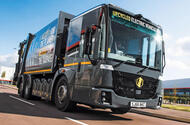UK firm folds before starting production of converted diesel HGV; classic car electromodding business unaffected
Commercial vehicle electrification firm Lunaz Applied Technologies (LAT) has entered administration, with the loss of around 40 jobs.
Autocar understands the three-year-old firm, founded in 2021 as an offshoot of classic car electrification specialist Lunaz, has folded after failing to obtain the necessary funding to begin production of its electric bin lorry, dubbed the Lunaz Upcycled Electric Vehicle.
However, Lunaz retains the intellectual property relating to its HGV electrification process and plans to restart the programme when the market environment is more hospitable.
The electromodding division - known for its zero-emission reworkings of classic Bentleys, Jaguars and Range Rovers – remains in operation and is understood to be unaffected by the move.
A spokesperson told Autocar: "The Lunaz Group is currently restructuring its business to rescope timelines for the start of production for commercial vehicle products. This means the business entity Lunaz Applied Technologies has stopped operations.
"This decision rebalances business focus to passenger cars, which remain in production, with order books open for [Lunaz's]Â five engineered EV platforms.
"It is intended that engineered commercial vehicle platforms will commence production at a later date, in response to confirmed and anticipated delays on the legislative requirement for fleets to transition to zero-emissions vehicles.
"This restructure will ensure demand for passenger vehicles can be met while ensuring commercial vehicles can be produced once market conditions drive demand."
LAT planned to ultimately be converting 1100 diesel-engined industrial vehicles to electric drivetrains each year, "to meet surging demand for electrified vehicles in the run-up to the 2030 [now 2035] ban on the sale of fossil-fuelled vehicles".
Last year, it agreed to supply waste management company Biffa with 10 Upcycled Electric Vehicles, in a deal that it said would save up to 210 tonnes in embedded carbon.
It then agreed a supply deal with Buckinghamshire Council, with plans to deliver the first lorry last autumn.

